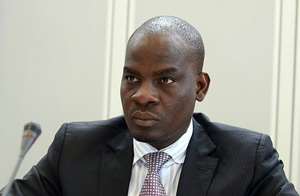
Haruna Iddrisu, Trade & Industry Minister
Haruna Iddrisu, Minister of Trade and Industry, says Civil Society Organizations (CSOs) cannot compel government not to sign the Economic Partnership Agreement (EPA) with the European Union (EU).
He warned of potential disruption of Ghana's exports to EU markets if the country fails to take a decision on the EPA by October 2014.
Speaking to journalists at the Meet-the-press encounter in Accra, Mr. Iddrisu said, 'We will not by swayed by threats from Civil society organizations that don't sign and if you sign then something must happen to the government. Clearly we will not tolerate things like that.
Whether the country signs the agreement or not, the EPA has an 'economic adjustment cost,' he said.
'If we do sign there will be revenue loses so we have to weigh the two options as a country and decide what to do before the deadline,' Mr. Iddrisu said.
He said the Ministry will be holding a public forum on Thursday to collate views of civil societies and the general public on the EPA.
Mr. Iddrisu said in anticipation of government's decision on the EPA, the Ministry has launched an export strategy and a National Export Development Programme to help identify strategies that can develop Ghana's export base, stating that the strategy will provide Ghana the direction for export.
Economic Partnership Agreement is a trade and development agreement negotiated between the EU and African, Caribbean and Pacific countries (ACP) engaged in a regional economic integration process.
Ghana in 2007 signed an interim agreement giving the EU 80 percent access to Ghana's market.
After various agreements by the EU-ACP in Cotonou and Lome, ECOWAS countries have been given an October 2014 deadline to sign the agreement or be denied access to the EU market.
The agreement allows Ghana to have 100 percent access to the European market except for rice and sugar, while EU countries will have 75 percent access to the Ghanaian market duty free and quota free.
Currently, over 40 per cent of the country's exports go to the EU market.
By Cephas Larbi




 We’ll protect state wealth from opaque deals – Prof Jane Naana
We’ll protect state wealth from opaque deals – Prof Jane Naana
 Mauritania president says running for second term in June polls
Mauritania president says running for second term in June polls
 I won't ever say I was a mere driver’s mate' — Prof. Opoku-Agyemang
I won't ever say I was a mere driver’s mate' — Prof. Opoku-Agyemang
 2024 polls: 'EC struggling to defend credibility'— Prof. Opoku-Agyemang
2024 polls: 'EC struggling to defend credibility'— Prof. Opoku-Agyemang
 Akufo-Addo gov't's 'greed, unbridled arrogance, unrestrained impunity, sheer dis...
Akufo-Addo gov't's 'greed, unbridled arrogance, unrestrained impunity, sheer dis...
 Election 2024: Ghana needs an urgent reset, a leadership that is inspiring – Ma...
Election 2024: Ghana needs an urgent reset, a leadership that is inspiring – Ma...
 Partner NDC to rollout a future of limitless prospects – Prof Jane Naana Opoku-A...
Partner NDC to rollout a future of limitless prospects – Prof Jane Naana Opoku-A...
 NPP will remain in gov’t till Jesus comes — Diana Asamoah
NPP will remain in gov’t till Jesus comes — Diana Asamoah
 Sunyani Technical University demands apology from former SRC president over sex-...
Sunyani Technical University demands apology from former SRC president over sex-...
 'Dumsor' was resolved by Mahama but ‘incompetent' Akufo-Addo has destroyed the g...
'Dumsor' was resolved by Mahama but ‘incompetent' Akufo-Addo has destroyed the g...
